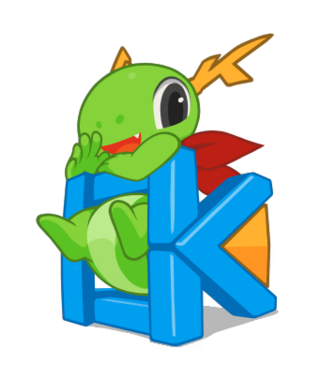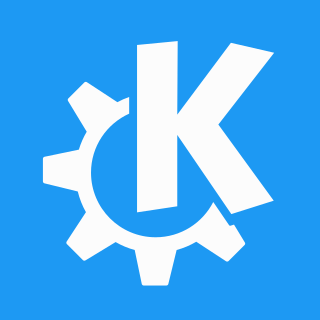The Gopher protocol is a communication protocol designed for distributing, searching, and retrieving documents in Internet Protocol networks. The design of the Gopher protocol and user interface is menu-driven, and presented an alternative to the World Wide Web in its early stages, but ultimately fell into disfavor, yielding to HTTP. The Gopher ecosystem is often regarded as the effective predecessor of the World Wide Web.

Konqueror is a free and open-source web browser and file manager that provides web access and file-viewer functionality for file systems. It forms a core part of the KDE Software Compilation. Developed by volunteers, Konqueror can run on most Unix-like operating systems. The KDE community licenses and distributes Konqueror under GNU GPL-2.0-or-later.

KHTML is a discontinued browser engine that was developed by the KDE project. It originated as the engine of the Konqueror browser in the late 1990s, but active development ceased in 2016. It was officially discontinued in 2023.
freedesktop.org (fd.o), formerly X Desktop Group (XDG), is a project to work on interoperability and shared base technology for free-software desktop environments for the X Window System (X11) and Wayland on Linux and other Unix-like operating systems. Although freedesktop.org produces specifications for interoperability, it is not a formal standards body.

Konsole is a free and open-source terminal emulator graphical application which is part of KDE Applications and ships with the KDE desktop environment. Konsole was originally written by Lars Doelle. It ls licensed under the GPL-2.0-or-later and the GNU Free Documentation License.
WebKit is a browser engine developed by Apple and primarily used in its Safari web browser, as well as all web browsers on iOS and iPadOS. WebKit is also used by the PlayStation consoles beginning from the PS3, the Tizen mobile operating systems, the Amazon Kindle e-book reader, Nintendo consoles beginning from the 3DS Internet Browser, and the discontinued BlackBerry Browser. WebKit's C++ application programming interface (API) provides a set of classes to display Web content in windows, and implements browser features such as following links when clicked by the user, managing a back-forward list, and managing a history of pages recently visited.

The KDE Advanced Text Editor, or Kate, is a source code editor developed by the KDE free software community. It has been a part of KDE Software Compilation since version 2.2, which was first released in 2001. Intended for software developers, it features syntax highlighting, code folding, customizable layouts, multiple cursors and selections, regular expression support, and extensibility via plugins. The text editor's mascot is Kate the Cyber Woodpecker.

The Apache Portable Runtime (APR) is a supporting library for the Apache web server. It provides a set of APIs that map to the underlying operating system (OS). Where the OS does not support a particular function, APR will provide an emulation. Thus programmers can use the APR to make a program truly portable across platforms.
The following tables compare general and technical information for a number of notable file managers.

KDE Software Compilation 4 was the only series of the so-called KDE Software Compilation, first released in January 2008 and the last release being 4.14.3 released in November 2014. It was the follow-up to K Desktop Environment 3. Following KDE SC 4, the compilation was broken up into basic framework libraries, desktop environment and applications, which are termed KDE Frameworks 5, KDE Plasma 5 and KDE Applications, respectively.

KDE Platform 4 was a collection of libraries and software frameworks by KDE that served as technological foundation for KDE Software Compilation 4 distributed under the GNU Lesser General Public License (LGPL). KDE Platform 4 was the successor to KDElibs and the predecessor of KDE Frameworks. KDE Platform 4 is the only version of KDE Platform, and in 2013 it was replaced by KDE Frameworks 5.

Dolphin is a free and open source file manager included in the KDE Applications bundle. Dolphin became the default file manager of the KDE Plasma desktop environments in the fourth iteration, termed KDE Software Compilation 4. It can also be optionally installed on K Desktop Environment 3. It replaces Konqueror as the default file manager for KDE SC 4, but Konqueror can still be used as an alternative file manager.

KDE Wallet Manager (KWallet) is free and open-source password management software written in C++ for UNIX-style operating systems. KDE Wallet Manager runs on a Linux-based OS and Its main feature is storing encrypted passwords in KDE Wallets. The main feature of KDE wallet manager (KWallet) is to collect user's credentials such as passwords or IDs and encrypt them through Blowfish symmetric block cipher algorithm or GNU Privacy Guard encryption.

K Desktop Environment 3 is the third series of releases of the K Desktop Environment. There are six major releases in this series. After the release of KDE 4, version 3.5 was forked into the Trinity Desktop Environment.

K Desktop Environment 2 was the second series of releases of the K Desktop Environment. There were three major releases in this series.

GIO is a library, designed to present programmers with a modern and usable interface to a virtual file system. It allows applications to access local and remote files with a single consistent API, which was designed "to overcome the shortcomings of GnomeVFS" and be "so good that developers prefer it over raw POSIX calls."

The KDE Software Compilation was an umbrella term for the desktop environment plus a range of included applications produced by KDE. From its 1.0 release in July 1998 until the release of version 4.4 in February 2010, the Software Compilation was simply known as KDE, which stood for K Desktop Environment until the rebrand. The then called KDE SC was used from 4.4 onward until the final release 4.14 in July 2014. It consisted of the KDE Plasma 4 desktop and those KDE applications, whose development teams chose to follow the Software Compilation's release schedule. After that, the KDE SC was split into three separate product entities: KDE Plasma, KDE Frameworks and KDE Applications, each with their own independent release schedules.
KJS is KDE's JavaScript engine that was originally developed for the KDE project's Konqueror web browser by Harri Porten in 2000.

The KDE Gear is a set of applications and supporting libraries that are developed by the KDE community, primarily used on Linux-based operating systems but mostly multiplatform, and released on a common release schedule.

KDE Projects are projects maintained by the KDE community, a group of people developing and advocating free software for everyday use, for example KDE Plasma and KDE Frameworks or applications such as Amarok, Krita or Digikam. There are also non-coding projects like designing the Breeze desktop theme and iconset, which is coordinated by KDE's Visual Design Group. Even non-Qt applications like GCompris, which started as a GTK-based application, or web-based projects like WikiToLearn are officially part of KDE.















